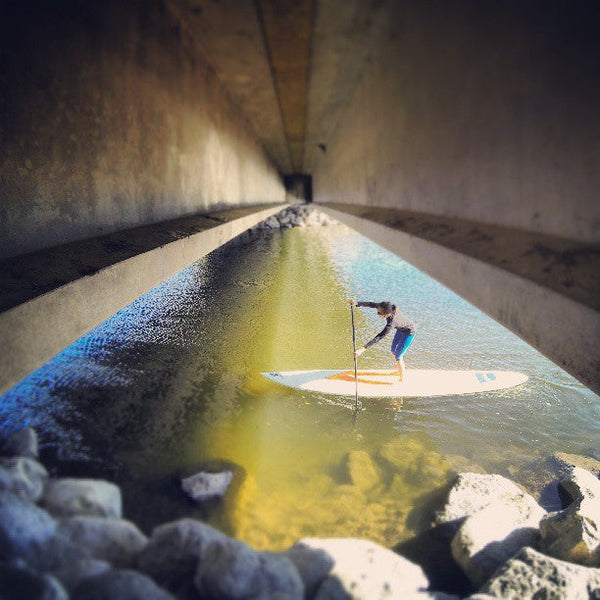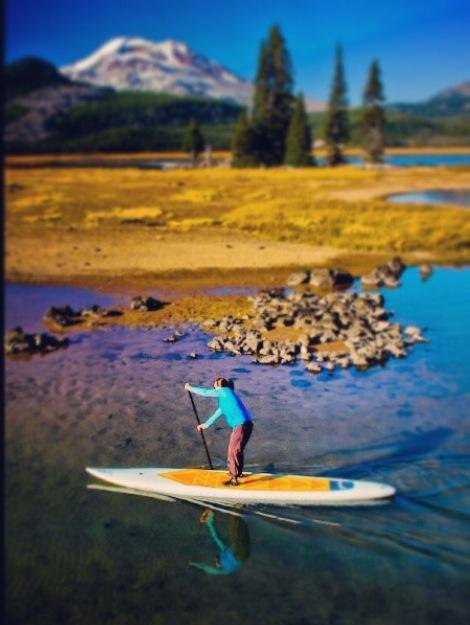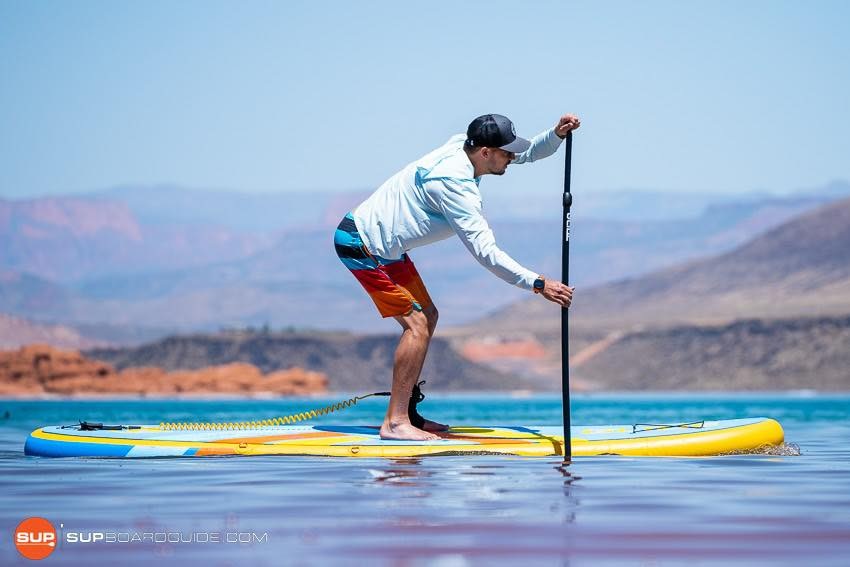
Paddle Board Nutrition: Eat, Drink, and Paddle Your Best
Simple, proven nutrition for better SUP: timing, carbs, protein, fluids, and electrolytes—plus meal ideas and on-board snacks for steadier energy and faster recovery.
Better paddling starts in the kitchen and your bottle. Eat carb-forward meals 2–4 hours pre-session, add a 25–40 g top-up 15–60 minutes out, and for efforts ≥90 minutes, take 20–60 g carbs/hour, 400–800 ml fluids/hour, and 300–600 mg sodium/hour in heat.
Post-paddle, target 20–35 g protein and 1–1.2 g/kg carbs plus fluids.
Build a small rotation of meals/snacks that you tolerate, pack simple on-board foods, and adjust for heat, wind, and duration.
Track what works, keep it consistent, and you’ll paddle steadier, recover faster, and feel stronger session after session.
Table of contents
 Final Thoughts FAQs
Final Thoughts FAQs
Great technique makes you smooth. Smart nutrition makes you durable. Whether you’re cruising a lake, stacking intervals, or racing a 10K, how you fuel before, during, and after a session decides your energy, focus, and recovery. This paddle board nutrition guide translates sports-nutrition basics into paddle-board reality—simple timing, portion sizes, hydration, and grab-and-go food ideas that actually work on the water.

What paddling demands from your body
SUP blends steady aerobic work with bursts (starts, turns, wind, chop). Expect 300–600+ kcal/hour for most adults depending on size, pace, wind/chop, and board drag. That means you need:
-
Carbs for quick fuel and brain focus.
-
Fluids + electrolytes to keep power and balance when it’s hot/windy.
-
Protein afterward to rebuild paddling muscles (lats, core, hips/legs).
The simple fueling timeline
12–3 hours pre-paddle (main meal):
-
Base = carbs (rice, pasta, oats, potatoes, quinoa) + lean protein + easy veg/fruit + 500–700 ml fluids.
-
Keep fat and fiber moderate (you want energy, not gut drama).
60–15 minutes pre-paddle (top-up):
-
Small 25–40 g carb snack + 300–500 ml fluids.
-
Examples: banana + honey, small granola bar, two rice cakes with jam, sports drink.
During (if on the water ≥75–90 minutes):
-
Carbs: 20–40 g/hour for steady paddles; up to 60 g/hour for hard/heat.
-
Fluids: 400–800 ml/hour (sip every 10–15 min).
-
Sodium: 300–600 mg/hour in heat or heavy sweaters (via sports drink, tabs, or chews).
Within 45 minutes after:
-
Protein: 20–35 g.
-
Carbs: 1–1.2 g/kg (especially after long or hard days).
-
Fluids: 1–1.5× the weight you lost (if you track body mass). Add electrolytes if you’re salty-sweat prone.
Easy pre-paddle meal ideas (mix & match)
-
2–3 hrs out (moderate session): Overnight oats + berries + Greek yogurt; or rice + eggs + avocado + fruit.
-
3–4 hrs out (long/hard): Turkey & rice bowl + cooked veg + olive oil; or quinoa + chickpeas + roasted sweet potato.
-
15–45 min top-up: Banana + small bar; applesauce pouch + pretzels; rice cake + jam; small sports drink.
On-board foods that won’t melt, mush, or cause mess
-
Carb chews/gels (practice with water).
-
Dried fruit (mango, dates) + salted nuts in small bags.
-
Fig bars, light granola bars, mini rice cakes, pretzels.
-
Electrolyte drink in a soft flask; hydration pack for hot/windy days.
Hydration without overthinking it
-
Start hydrated: Pale-straw urine, not clear (over-dilution can drop sodium).
-
Bring more than you think: Heat, wind, and chop raise sweat rate.
-
If you routinely finish with a salt crust on your hat/shirt, you’re a heavy sodium sweater—aim toward the upper sodium range and include salty snacks.
-

Heat, cold, wind: tweak your paddle board nutrition plan
-
Heat: Higher fluids/sodium, more frequent sips, lighter flavors to avoid taste fatigue. Freeze one bottle ¾ full so it melts cold.
-
Cold: You still dehydrate (dry air + layers). Warm tea + honey or lightly flavored drink improves intake.
-
Wind/chop: Smaller, more frequent sips and bites; choose one-hand snacks.
Race-day and interval tweaks
-
Carb-load (light): Increase carb portions 24–36 hrs pre-race while keeping fiber moderate.
-
Breakfast (2–3 hrs): 80–120 g carbs + 20–30 g protein (e.g., oatmeal + banana + yogurt).
-
Caffeine (optional): 1–3 mg/kg 45–60 min pre-start (trial in training first).
-
On course: 40–60 g carbs/hour via gels/chews/drink; sodium 300–600 mg/hour depending on heat.
-
Post: Protein 25–35 g + high-GI carbs; then a balanced meal 1–2 hrs later.
Protein without the confusion
-
Daily target (active paddlers): 1.4–1.8 g/kg/day (higher end in heavy blocks).
-
Spread across 3–4 feedings (20–35 g per).
-
Sources: eggs, dairy/Greek yogurt, lean meats/fish, tofu/tempeh, beans + grains, protein smoothies.
Anti-inflammatory, antioxidant, and gut-happy choices
-
Rainbow plants: berries, citrus, leafy greens, peppers, tomatoes.
-
Healthy fats: olive oil, nuts, seeds, avocado, fatty fish.
-
Spices: ginger, turmeric + black pepper.
-
Gut ease: if you’re sensitive, choose low-fiber options pre-paddle; test lactose if dairy bothers you.
Vegan & gluten-free ideas (that still fuel hard)
-
Vegan: tofu scramble + rice; lentil pasta + red sauce; smoothie (soy milk + banana + oats + PB + spinach).
-
Gluten-free: rice bowls, potatoes, GF oats, corn tortillas with eggs/beans, GF fig bars.
-
Pack vegan chews/gels and GF pretzels for mid-paddle carbs.
Supplements: what’s worth considering
-
Creatine monohydrate (3–5 g/day): Helps repeated sprints/strength; hydrate well.
-
Beta-alanine (daily loading): Can aid high-intensity repeat efforts; may cause harmless tingles.
-
Electrolyte mixes: Convenient sodium/potassium/magnesium delivery.
-
Beetroot (nitrate): May modestly support endurance; test in training.
-
Skip unproven “fat burners” and mega-antioxidants around training (they can blunt adaptation).
Your personal playbook (quick steps)
-
Pick two pre-paddle meals and two top-ups you tolerate well—rotate them.
-
Weigh before/after a long paddle once to estimate your fluid gap.
-
During sessions >90 minutes, carry carbs + electrolytes and set a 10–15-minute sip timer.
-
Log what you ate/drank and how you felt. Tweak one variable at a time.
-
In heat or race blocks, test higher carbs and higher sodium—in training first.
Final Thoughts
Eat simple, eat on time, and carry what you’ll actually consume on the water. Most paddlers under-fuel and under-hydrate; fixing those two habits unlocks steadier speed, better balance late in the session, and faster recovery tomorrow. Build a small, repeatable routine and keep notes—your best plan is the one you’ll follow.
FAQs
Do I need sports drinks for easy 45-minute paddles?
Water is fine. Save carbs/electrolytes for hotter days or sessions ≥75–90 minutes.
How much should I drink per hour?
Start with 400–800 ml/hour and adjust for heat, wind, and sweat rate.
Cramping—salt or fitness?
Usually both. Increase training consistency, include 300–600 mg sodium/hour in heat, and practice race fueling.
What’s a quick recovery meal if I’m busy?
Greek yogurt + fruit + granola; rice + tuna/salmon; smoothie with milk/soy, banana, oats, and protein.
Will low-carb make me bonk less?
For performance sessions, carbs enhance output. Use carbs strategically even if you eat lower-carb outside training.
Is coffee OK before paddling?
Yes—test tolerance. Caffeine can improve effort perception and power.
How do I avoid GI issues on race day?
Practice your exact pre-meal and on-board carbs several times. Avoid new foods and keep fiber lower.
Vegan protein—enough?
Yes. Combine legumes + grains, add tofu/tempeh/soy milk, or use a vegan protein powder to hit 1.4–1.8 g/kg/day.
Do I need to carb-load?
Lightly increase carbs 24–36 hours pre-race and keep fiber moderate. No giant pasta brick the night before.
What about alcohol after paddling?
It dehydrates and slows recovery. Rehydrate, eat, then if you choose to drink, keep it modest.





